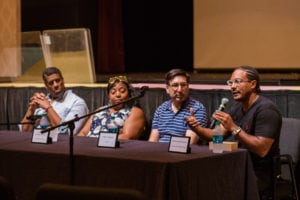
Shelton McElroy (right) makes a point during an August 5 panel discussion on the subject at CenterStage. (Community photo by Tara Cocco)
CenterStage wrapped up its performance run of Hairspray, a musical that deals with racial equality, on Sunday, August 5, with a panel discussion on racial equality in Louisville and nationwide.
The final performance wasa followed by a one-hour discussion of race issues by a four-member panel – Frank Goodloe, CenterStage production manager; Shelton McElroy, national deputy director of operations for the Bail Project and a Street Academy instructor for the Louisville Urban League; Shameka Parrish-Wright, bail disrupter and client advocate for The Bail Project; and Corey Shapiro, legal director for the ACLU of Kentucky.
Set in Baltimore during the 1960s, Hairspray is about a teenage girl who wants to dance on a local TV show, which is racially segregated.
Moderated by JCRC Director Matt Goldberg, the panel discussed arts and equality while exploring ways the community can help make Louisville a more equal and inclusive place for all its residents.
Throughout the discussion, the panelists helped the audience brainstorm ways in which they can lead by example in their community:
• Donating to organizations working for racial justice and equality;
• Supporting local empowerment initiatives;
• Support companies that prioritize diversity;
• Boycotting companies that profit from the private prison industrial complex.
The disparity in the incarceration rates for blacks and whites became a significant topic of discussion. According to McElroy, the United States is the world leader in incarceration rates, with 2.2 million people in prisons and jails across the country. People of color make up 67 percent of the U.S. prison population while composing just 37 percent of the population.
Overall, African-Americans are more likely than white Americans to be arrested; once arrested, they are more likely to be convicted; and once convicted, they are more likely to face stiff sentences.
Black men specifically are six times as likely to be incarcerated as a white or Hispanic man.
The incarceration rate for African-Americans has led to voter disenfranchisement, according to Shapiro.
“Kentucky is one of three states that has a lifetime ban on felons voting,” he said, “and that has resulted in 26 percent of all African-Americans in the state of Kentucky being excluded from our political process.”
Parrish-Wright lamented how many women find themselves behind bars
“A lot of women we deal with are usually in jail for defending themselves in domestic situations,” she said.
Many of those arrested end up in jailsimply because they can’t afford bail. That leads to greater punishment for poorer people, largely African-Americans, while their cases are pending
The Bail Project fights mass incarceration by paying bail for low-income Americans.
“It’s not perfect; you will have repeat offenders, you will have recidivism,” Parrish-Wright said, “but poverty shouldn’t be a crime.”
The panelists offered ideas such as of eliminating mandatory minimum sentences, shifting resources to community-based prevention and treatment facilities, examining and addressing the policies that contribute to racial inequality at every level of the justice system, and removing barriers that make it harder for individuals with criminal records to turn their lives around.
The panel discussion was not the first CenterStage has held, and according to Anne Ensign-Urteaga, its operations manager, it probably won’t be the last.
“If can find relevant speakers, have meaningful conversations that the audience wants to be involved with,” she said, “then I will continue to do it.”
(Community Editor Lee Chottiner contributed to this story.)


